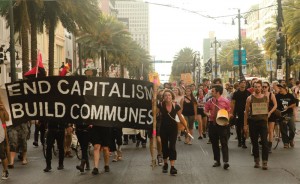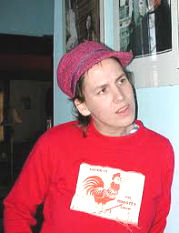John Clark
John Clark
Anarchic Justice at the End of History
Anarchy and the Law of Nature
It has been said that self-preservation is the first law of nature, and that the basis of justice lies in protecting ourselves from one another. This is a perennial lie of the system of domination.
In reality, the flourishing of the community is the primary aim of nature, and mutual aid and solidarity in pursuit of this aim is the primal, originating law of nature. Nurture is the first law of nature. All justice flows from this source.
Apr 14, 2020 Read the whole text...
John Clark
Anything Can Happen—Or Not
May 1968 & the Question of Possibility
“Sous les paves, la plage!” [Under the paving stones, the beach!]
—Revolutionary slogan; Paris 1968
1968 was an “Anything Can Happen” kind of year.
It was the year of the Prague Spring, the Tet Offensive, President LBJ’s abdication, massive student protests, the assassinations of Martin Luther King, Jr. and Robert Kennedy, the police riots at the Chicago Democratic Convention. The most historically momentous occurrence of that year was the May June uprising and general strike by students and workers in France.
Dec 8, 2018 Read the whole text...
John Clark
The Utopian
a review of
The Utopian: A journal of Anarchism and Libertarian Socialism, August 2000, 58 pp. Published by The Utopian Publishing Co., P.O. Box 387, College Station, New York, NY 10030. $5.00 for one issue or $8.00 for two.
The Utopian is a promising new anarchist journal that will probably strike various readers quite differently, depending on their expectations. Those who, guided by the subtitle, are looking for a new “journal of anarchism and libertarian socialism” will probably find it to be much to their liking, since it focuses heavily on theory and is more sophisticated in this area than most anarchist publications. On the other hand, those drawn to the title expecting daring flights of the utopian imagination, or investigations of the status of various Temporary Autonomous Zones may be a bit let down.
Apr 17, 2021 Read the whole text...
John Clark
Happy Birthday, Utopia!
(You Deserve a Present)
This year marks five-hundred years since the appearance of English social philosopher, author, statesman, and Renaissance humanist Thomas More’s famous Utopia. We might also consider that it is just over five-hundred years since the definitive anti-utopia, Machiavelli’s The Prince was published.
We might say that the entire modern age has been a struggle between utopia and anti-utopia. Even more, it is a struggle between utopia and the dystopia that is at the heart of the dominant utopia.
Jul 11, 2016 Read the whole text...
John Clark
Introduction to “A Non-Euclidean View of California as a Cold Place To Be”
Ursula Le Guin’s works typically recount the story of a voyage. Whether or not this voyage traverses vast distances of space, it is always an epic journey of the spirit. It is a kind of vision quest in which we who allow ourselves to be taken along confront the strange, the alien, the other, only to return with a deeper understanding of ourselves. We gain a better sense of who we are, but as is perhaps more crucial, we gain insight into where we are. In the end, the voyage is a journey home.
Mar 26, 2014 Read the whole text...
John Clark
Joseph Déjacque
The Anarchist Almost No One Knows
Joseph Déjacque was a major 19th-century communist anarchist political theorist and visionary utopian writer, born in Besancon, France on December 27, 1821. To celebrate the bicentennial year of his birth, two New Orleans-based groups, are convening a Déjacque Bicentennial Conference on December 10 and 11.
Jan 18, 2023 Read the whole text...
John Clark
Kropotkin’s Ideas
Mutual aid, evolution and revolution, conflict resolution, social individuality, and the metaphysics of nature
a review of
Graham Purchase, Evolution & Revolution: An Introduction to the Life and Thought of Peter Kropotkin (Petersham, Australia: Jura Books, 1996)
Graham Purchase’s recent book, Evolution & Revolution, is a concise and generally useful assessment of Kropotkin’s-life and work from a social anarchist perspective. In addition to presenting a brief biography of the famous anarchist, Purchase analyses Kropotkin’s ideas on such topics as mutual aid, evolution and revolution, conflict resolution, social individuality, and the “metaphysics of nature.”
Mar 16, 2021 Read the whole text...
John Clark
Letter from New Orleans
Reclusian Reflections on an Unnatural Disaster
The following letter was sent to an International Conference on Elisee Reclus, the 19th century anarchist geographer and political theorist. The conference, which was held in Milan on October 12–13, was one of several planned for 2005 to celebrate the 175th anniversary of Reclus’ birth and the 100th anniversary of his death. I was invited to do a presentation but couldn’t leave New Orleans to attend. Fortunately, our electricity, which had been out for almost six weeks, resumed shortly before the conference, and I was able to write the letter hastily and find a place to email it. It arrived in Milan the day before the conference and was read during the proceedings, and it will be translated and published in the Italian anarchist magazine Libertaria.
May 6, 2015 Read the whole text...
John Clark
Living Our Lives
The Communal Basis of Social Transformation
If anarchist politics, the politics of communal liberation, is to escape from its present historical impasse, it must become, above all, a practice of creating the free community, here and now.
The greatest transformative force is living life together in a community of liberation and solidarity in which the greatest possibilities for personal and communal flourishing are unleashed through mutual aid and free association. A recognition of the power of this collective force must guide our practice.
Oct 29, 2020 Read the whole text...
John Clark
Occupy New Orleans Fights Off the authoritarian Left to defend Horizontalism

It was encouraging to see large numbers of anarchists and anti-authoritarians at a late March Occupy New Orleans General Assembly (OccupyNOLA). As one of the participants mentioned, Occupy is in many ways the most significant grassroots uprising since the Vietnam Era.
Sep 7, 2013 Read the whole text...
John Clark
On Living in the World
Revisiting Ursula Le Guin’s Always Coming Home
Recently, the Anarchist Political Ecology Group (the APE Group) read and discussed Ursula Le Guin’s book Always Coming Home. Though it’s a work I often go back to, this was the first time I had read it cover to cover in about thirty-five years.
I first discovered Le Guin’s work when I read The Dispossessed in the mid-1970s. The book had a huge effect on the members of the anarchist group I was in at the time, the Black Pearl Mutual Aid and Pleasure Club in New Orleans.
Nov 10, 2021 Read the whole text...
John Clark
Raging Against the Machine
...at the Dawn of the Anthropocene
a review of
Red Round Globe Hot Burning: A Tale at the Crossroads of Commons and Closure, of Love and Terror, of Race and Class, and of Kate and Ned Despard by Peter Linebaugh. University of California Press, 2019
The title of this fascinating and inspiring work comes from visionary poet William Blake (1757–1827). In one of his most memorable passages, Blake writes that “They told me that I had five senses to enclose me up, / And they inclos’d my infinite brain into a narrow circle,/ And sunk my heart into the Abyss, a red round globe hot burning/ Till all from life I was obliterated and erased.”
Feb 9, 2020 Read the whole text...
John Clark
Remembering Helen Hill
A New Orleans community comes together after the murder of a friend and activist
On February 24, I joined a large crowd to march in a jazz funeral celebrating the life of our friend, the filmmaker and community activist, Helen Hill. Helen was murdered at her home on January 4 by an intruder whose motives remain a mystery.

Hundreds of people gathered in the Mid-City neighborhood at the home that she once shared with her husband, Paul Gailiunas, a doctor, musician, and fellow community activist, and their small child, Francis Pop.
Feb 22, 2015 Read the whole text...
John Clark
Sam Dolgoff
A Life at the center of American anarchism for seventy years
a review of
Left of the Left: My Memories of Sam Dolgoff by Anatole Dolgoff; Introduction by Andrew Cornell. AK Press, 2016, 391 pp., $22.
Anatole Dolgoff is a great story-teller. He does the kind of writing that is rare on the left. It never seems to occur to most political writers that entertaining people is not a bad thing. It occurs all the time to Anatole.
Jan 21, 2017 Read the whole text...
John Clark
The Dialectic of Enchantment
What Enchantment do we Seek?
According to a certain conventional wisdom, there has been an unfortunate disenchantment of the world, and what is desperately needed is that we rediscover and recreate an enchanted world. This is, however, at best a half truth, and perhaps even a dangerous one.
True, there is a battle between disenchantment and re-enchantment in which we must rally to the aid of enchantment. But there is also a war between contending forms of enchantment that already exist, here and now This is the ultimate world-historical conflict that must engage our creative energies.
Sep 9, 2019 Read the whole text...
John Clark
The Geography of Possibility
Simon Springer on the Spaces of Liberation
a review of
The Anarchist Roots of Geography: Toward Spatial Emancipation by Simon Springer. University of Minnesota Press, 2016
Anyone who wants evidence that anarchist geography is alive and well today need only read this book. The author, Simon Springer, is one of the most active anarchist intellectuals today. In 2016, he authored two books and edited five, mostly on anarchist themes, and he has written numerous articles, some technical, but many deeply immersed in contemporary struggles.
Jan 2, 2018 Read the whole text...
John Clark
The Revolution Will be Powered by Shakti Energy
Lessons from Vandana Shiva’s Navdanya Biodiversity Farm
I traveled to Dharamsala, India in 2005 to set up a one-month summer study program, in collaboration with the Louisiana Himalaya Association, and have taken groups of students there periodically since then. During last summer’s trip, we visited renowned ecofeminist theorist and activist Vandana Shiva’s Navdanya Biodiversity Farm. We toured the fields and the seed bank, heard lectures by staff members specializing in various areas of agroecology, and were extremely fortunate that Shiva herself could speak to our small group about Navdanya and the ecofeminist politics of Earth Democracy.
Apr 24, 2019 Read the whole text...
John Clark
The Society of the Spectacle Reconsidered
Good Marx or Bad Marx?
a review of
The Society of the Spectacle by Guy Debord
Newly translated & annotated by Ken Knabb,
Bureau of Public Secrets, 2014, 150 pages. $15. bopsecrets.org
For those interested in Situationist ideas, this is an auspicious time to reconsider Guy Debord’s The Society of the Spectacle, originally published in 1967. Ken Knabb’s recently revised translation is a valuable resource for the study of Debord and the Situationists.
Feb 26, 2015 Read the whole text...
John Clark
The Tao of Anarchy
How Modern Anarchism Echoes Ancient Wisdom
This essay originally appeared in John Clark’s now out-of-print The Anarchist Moment: Reflections on Culture, Nature and Power (Black Rose Books, Montreal, 1984) as “Master Lao and the Anarchist Prince.” John is Professor of Philosophy and Chair of Environmental Studies at Loyola University, New Orleans. He edits the Freeport Watch Bulletin, covering the activities of the evil Freeport-McMoRan mining corporation from POB 79, Loyola Univ., New Orleans LA 70118.
Feb 7, 2016 Read the whole text...
